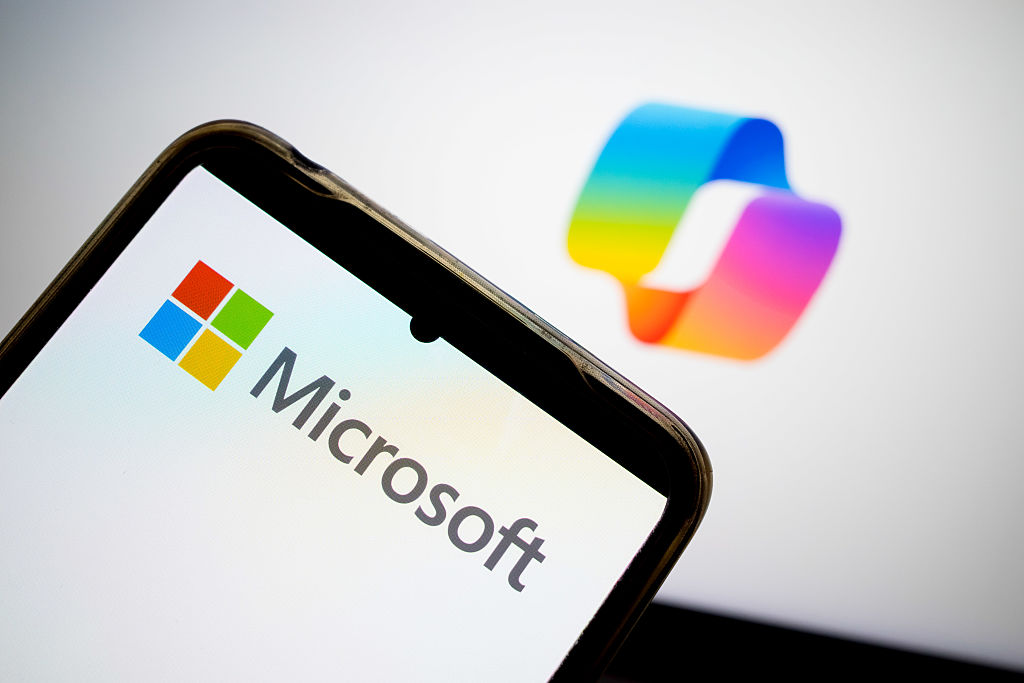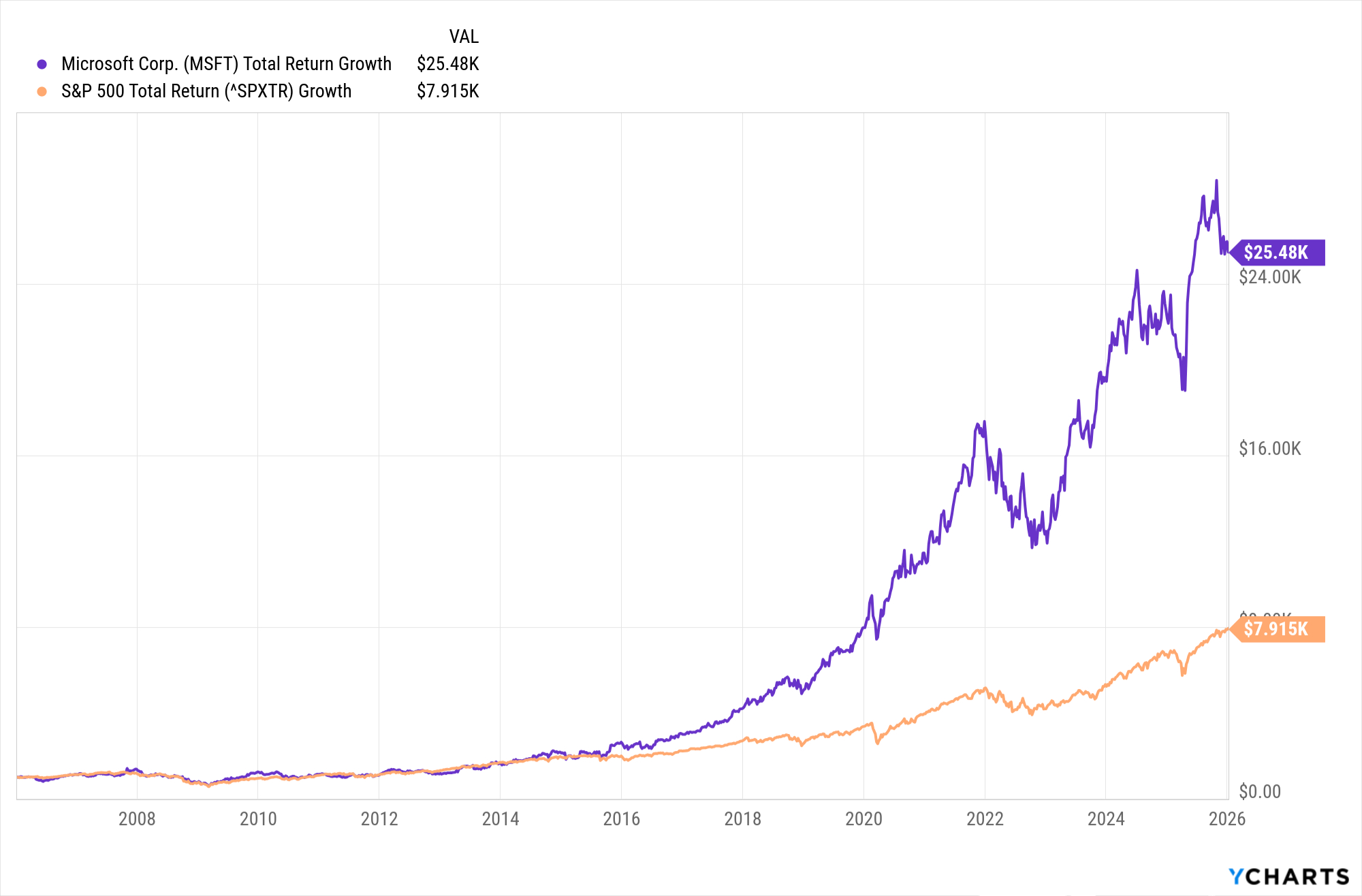If You'd Put $1,000 Into Microsoft Stock 20 Years Ago, Here's What You'd Have Today
Microsoft has been an astounding buy-and-hold bet for truly long-term investors.



Profit and prosper with the best of Kiplinger's advice on investing, taxes, retirement, personal finance and much more. Delivered daily. Enter your email in the box and click Sign Me Up.
You are now subscribed
Your newsletter sign-up was successful
Want to add more newsletters?
Not too long ago, Microsoft (MSFT) stock's glory days looked to be behind it as sales of desktop PCs slipped into a seemingly irreversible decline.
Although the dot-com days of the 1990s minted many a "Microsoft millionaire," the aftermath of the tech bust led Microsoft stock to trade mostly sideways for more than a decade.
But the past 10-plus years have been nothing short of a renaissance for the tech giant. When CEO Satya Nadella ascended to the top job in 2014, he not only began instituting cultural changes, but he transformed Microsoft's core strategy too.
From just $107.88 $24.99 for Kiplinger Personal Finance
Become a smarter, better informed investor. Subscribe from just $107.88 $24.99, plus get up to 4 Special Issues

Sign up for Kiplinger’s Free Newsletters
Profit and prosper with the best of expert advice on investing, taxes, retirement, personal finance and more - straight to your e-mail.
Profit and prosper with the best of expert advice - straight to your e-mail.
Cloud computing and subscription-based services were in; the days of selling software licenses via physical compact disks were passé.
That focus on enterprise customers and – most importantly – Microsoft's shift to selling cloud-based services such as Azure and Office 365 has been an astounding success.
Today, Microsoft is a dominant player in cloud computing and a leader in artificial intelligence (AI) – and MSFT's returns prove it.
Indeed, Microsoft stock has been so remunerative since Nadella took over that long-term investors might not even notice that dud decade-plus following the tech bust.
Between January 1990 and December 2020, shares in Microsoft, which joined the Dow in 1999 at the height of the dot-com boom, generated a total return of 57,730%. The S&P 500's total return came to a mere 1,950% over the same span.
Along the way, Microsoft generated $1.91 trillion in wealth for shareholders, good for an annualized dollar-weighted return of 19.2%, according to Hendrik Bessembinder, professor of finance at the W.P. Carey School of Business at Arizona State University.
Only Apple (AAPL) generated more wealth for shareholders over those three decades, making Microsoft one of the best stocks of the past 30 years, per Bessembinder's findings, which account for cash flows in and out of the business and other adjustments.
The bottom line on Microsoft stock
Have a look at the chart below and you'll see that if you put a grand into Microsoft stock two decades ago, it would be worth about $25,000 today. That's good for an annualized total return (price change plus dividends) of 17.6%.
The same amount invested in the S&P 500 20 years ago would theoretically be worth almost $8,000 today, or 10.9% annualized.

But wait, there's more.
Over its entire life as a publicly traded company, Microsoft has generated an annualized total return of 21.8%. The S&P 500's total return comes to 10.8% annualized over the same span.
Happily for Microsoft bulls, analysts very much expect shares to continue their market-smashing ways.
Of the 57 analysts issuing opinions on Microsoft stock surveyed by S&P Global Market Intelligence, 43 call it a Strong Buy, 12 say Buy and two have it at Hold.
It's rare for a stock with this much coverage to receive no Hold or Sell calls. The result is a consensus recommendation of Strong Buy with extremely high conviction.
No wonder MSFT routinely ranks as a top-rated Dow Jones stock, as well as one of analysts' top S&P 500 stocks to buy now.
Check out the stocks billionaires are buying or hedge funds' top blue chip stocks and you'll see that much of the putative smart money agrees with Wall Street's assessment.
More Stocks of the Past 20 Years
- If You'd Put $1,000 Into Netflix Stock 20 Years Ago, Here's What You'd Have Today
- If You'd Put $1,000 Into Nvidia Stock 20 Years Ago, Here's What You'd Have Today
- If You'd Put $1,000 Into Amazon Stock 20 Years Ago, Here's What You'd Have Today
Profit and prosper with the best of Kiplinger's advice on investing, taxes, retirement, personal finance and much more. Delivered daily. Enter your email in the box and click Sign Me Up.

Dan Burrows is Kiplinger's senior investing writer, having joined the publication full time in 2016.
A long-time financial journalist, Dan is a veteran of MarketWatch, CBS MoneyWatch, SmartMoney, InvestorPlace, DailyFinance and other tier 1 national publications. He has written for The Wall Street Journal, Bloomberg and Consumer Reports and his stories have appeared in the New York Daily News, the San Jose Mercury News and Investor's Business Daily, among many other outlets. As a senior writer at AOL's DailyFinance, Dan reported market news from the floor of the New York Stock Exchange.
Once upon a time – before his days as a financial reporter and assistant financial editor at legendary fashion trade paper Women's Wear Daily – Dan worked for Spy magazine, scribbled away at Time Inc. and contributed to Maxim magazine back when lad mags were a thing. He's also written for Esquire magazine's Dubious Achievements Awards.
In his current role at Kiplinger, Dan writes about markets and macroeconomics.
Dan holds a bachelor's degree from Oberlin College and a master's degree from Columbia University.
Disclosure: Dan does not trade individual stocks or securities. He is eternally long the U.S equity market, primarily through tax-advantaged accounts.
-
 Why Some Michigan Tax Refunds Are Taking Longer Than Usual This Year
Why Some Michigan Tax Refunds Are Taking Longer Than Usual This YearState Taxes If your Michigan tax refund hasn’t arrived, you’re not alone. Here’s what "pending manual review" means and how to verify your identity if needed.
-
 If You'd Put $1,000 Into Caterpillar Stock 20 Years Ago, Here's What You'd Have Today
If You'd Put $1,000 Into Caterpillar Stock 20 Years Ago, Here's What You'd Have TodayCaterpillar stock has been a remarkably resilient market beater for a very long time.
-
 Good Stock Picking Gives This Primecap Odyssey Fund a Lift
Good Stock Picking Gives This Primecap Odyssey Fund a LiftOutsize exposure to an outperforming tech stock and a pair of drugmakers have boosted recent returns for the Primecap Odyssey Growth Fund.
-
 If You'd Put $1,000 Into Caterpillar Stock 20 Years Ago, Here's What You'd Have Today
If You'd Put $1,000 Into Caterpillar Stock 20 Years Ago, Here's What You'd Have TodayCaterpillar stock has been a remarkably resilient market beater for a very long time.
-
 Good Stock Picking Gives This Primecap Odyssey Fund a Lift
Good Stock Picking Gives This Primecap Odyssey Fund a LiftOutsize exposure to an outperforming tech stock and a pair of drugmakers have boosted recent returns for the Primecap Odyssey Growth Fund.
-
 More Tools to Build a Bond Ladder
More Tools to Build a Bond LadderVanguard aims to launch a line of target-maturity corporate bond ETFs.
-
 A Newly Retired Couple With a Portfolio Full of Winners Faced a $50,000 Tax Bill: This Is the Strategy That Helped Save Them
A Newly Retired Couple With a Portfolio Full of Winners Faced a $50,000 Tax Bill: This Is the Strategy That Helped Save ThemLarge unrealized capital gains can create a serious tax headache for retirees with a successful portfolio. A tax-aware long-short strategy can help.
-
 5 Retirement Myths to Leave Behind (and How to Start Planning for the Reality)
5 Retirement Myths to Leave Behind (and How to Start Planning for the Reality)Separating facts from fiction is an important first step toward building a retirement plan that's grounded in reality and not based on incorrect assumptions.
-
 I'm a Financial Adviser: Silence Is Golden, But It Hurts Your Heirs More Than You Think
I'm a Financial Adviser: Silence Is Golden, But It Hurts Your Heirs More Than You ThinkTalking to heirs about transferring wealth can be overwhelming, but avoiding it now can lead to conflict later. Here's how to start sharing your plans.
-
 Dow Dives 521 Points as Goldman, AmEx Slide: Stock Market Today
Dow Dives 521 Points as Goldman, AmEx Slide: Stock Market TodayNews of Block's massive layoffs exacerbated AI worries across the financial sector.
-
 The Merger Market is Heating Up. Here's How to Cash In
The Merger Market is Heating Up. Here's How to Cash InInvesting in takeover deals can be a low-volatility way to diversify your portfolio.